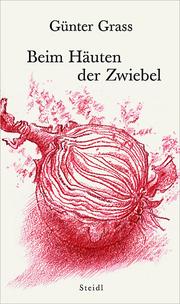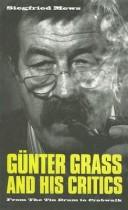| Listing 1 - 6 of 6 |
Sort by
|

ISBN: 3865213308 9783865213303 Year: 2006 Publisher: Göttingen Steidl
Abstract | Keywords | Export | Availability | Bookmark
 Loading...
Loading...Choose an application
- Reference Manager
- EndNote
- RefWorks (Direct export to RefWorks)
Authors, German --- Grass, Günter, --- Grass, Günter --- Грасс, Гюнтер, --- גראס, גינטר, --- Ґрас, Ґюнтер, --- Gras, Gi︠u︡nter, --- Girās, Gūntir, --- Grās, Gūntir, --- گونتر، گراس, --- Грасс, Гюнтер --- Ґрас, Ґюнтер --- Gras, Gi︠u︡nter --- Girās, Gūntir --- Grās, Gūntir
Book
ISBN: 900429189X 9004291881 9789004291898 9789004291881 Year: 2016 Publisher: Leiden Brill
Abstract | Keywords | Export | Availability | Bookmark
 Loading...
Loading...Choose an application
- Reference Manager
- EndNote
- RefWorks (Direct export to RefWorks)
The Echo of Die Blechtrommel in Europe presents an overview and analysis of the critical reception of Günter Grass’s classic novel throughout Europe. Starting from the reviews on its first publication in Germany in 1959, it follows the reception of its translations in Poland, Italy, the UK, The Netherlands, Belgium, France, Finland and Sweden. Press reviews for the general public form the main object of research in this volume. The articles reveal the different roles played by religious, political and ideological matters in the reception of the novel in the respective European countries. The articles, written by specialists from the countries under study, also reveal national differences and resemblances in the institutions of literary life in Europe.
Grass, Günter --- German literature --- Criticism and interpretation. --- Grass, Günter, --- Грасс, Гюнтер, --- גראס, גינטר, --- Ґрас, Ґюнтер, --- Gras, Gi︠u︡nter, --- Girās, Gūntir, --- Grās, Gūntir, --- گونتر، گراس, --- Grass, Günter --- Грасс, Гюнтер --- Ґрас, Ґюнтер --- Gras, Gi︠u︡nter --- Girās, Gūntir --- Grās, Gūntir --- Literary studies: from c 1900 --- -German literature --- -Criticism and interpretation. --- -Grass, Günter --- -Social sciences. --- Social sciences.
Book
ISBN: 9781571139566 1571139567 9781787441743 1787441741 Year: 2018 Publisher: Rochester, New York Camden House
Abstract | Keywords | Export | Availability | Bookmark
 Loading...
Loading...Choose an application
- Reference Manager
- EndNote
- RefWorks (Direct export to RefWorks)
A major contribution to Grass scholarship that looks at his career as a whole and identifies four phases or stages of his writing in terms of communicative strategy and style.
Grass, Günter, --- Criticism and interpretation. --- Grass, Günter --- Grass, Günter, --- Grass, Günter --- Грасс, Гюнтер --- גראס, גינטר, --- Ґрас, Ґюнтер --- Gras, Gi︠u︡nter --- Girās, Gūntir --- Grās, Gūntir --- گونتر، گراس, --- LITERARY CRITICISM / European / German. --- Autobiography. --- Communicative strategy. --- Controversies. --- Dialogue. --- German nation. --- German writers. --- Günter Grass. --- Public intellectual. --- Social criticism. --- Social practices.

ISBN: 9781571130624 1571130624 9781571137968 9786612946790 1571137963 128294679X Year: 2008 Publisher: Rochester, N.Y. ; Woodbridge : Camden House,
Abstract | Keywords | Export | Availability | Bookmark
 Loading...
Loading...Choose an application
- Reference Manager
- EndNote
- RefWorks (Direct export to RefWorks)
When the Swedish Academy announced that Günter Grass had been awarded the 1999 Nobel Prize for Literature, it singled out his first novel 'The Tin Drum' (1959, English translation 1963) as a seminal work that had signaled the postwar rebirth of German letters, auguring 'a new beginning after decades of linguistic and moral destruction.' Nearly fifty years after its publication, the novel's significance has been generally acknowledged: it is the uncontested favorite among Grass's works of fiction on the part of reading public and critics alike, yet its canonical status tends to obscure the decidedly mixed and even hostile reactions it initially elicited. Along with 'The Tin Drum,' Grass's impressive body of literary work since the 1950s has spawned a cottage industry of Grass criticism, making a reliable guide through the thicket of sometimes contradictory readings a definite desideratum. Siegfried Mews fills this lacuna in Grass scholarship by way of a detailed but succinct, descriptive as well as analytical and evaluative overview of the scholarship from 1959 to 2005. Grass's politically motivated interventions in public discourse have kept him highly visible, blurring the boundaries between politics and aesthetics. Mews therefore examines not only academic criticism but also the daily and weekly press (and other news media), providing additional insight into the reception of Grass's works. Siegfried Mews is Professor of German at the University of North Carolina at Chapel Hill. Winner, CHOICE Outstanding Academic Title Award, 2008.
Criticism --- History --- Grass, Günter, --- Criticism and interpretation --- Appreciation --- Grass, Gu��nter, --- Criticism and interpretation. --- Appreciation. --- Critique et interprétation --- Appréciation --- Grass, Günter, --- Grass, Günter --- Critique et interprétation. --- Appréciation. --- Criticism - Germany - History - 20th century --- Grass, Günter, - 1927- - Criticism and interpretation --- Grass, Günter, - 1927- - Appreciation --- Grass, Günter --- Грасс, Гюнтер --- גראס, גינטר, --- Ґрас, Ґюнтер --- Gras, Gi︠u︡nter --- Girās, Gūntir --- Grās, Gūntir --- گونتر، گراس, --- Grass, Günter, - 1927 --- -Grass, Günter, - 1927 --- -Criticism --- EVIEW. --- Grass, Gunter,
Book
ISBN: 1800100329 180010040X 1640140859 Year: 2021 Publisher: Rochester, New York : Camden House,
Abstract | Keywords | Export | Availability | Bookmark
 Loading...
Loading...Choose an application
- Reference Manager
- EndNote
- RefWorks (Direct export to RefWorks)
The first book to examine the connection between gender and memory in Grass's oeuvre, which is especially timely in light of current concerns about male privilege.
Sex role in literature. --- Memory in literature. --- Memory as a theme in literature --- Grass, Günter, --- Grass, Günter --- Грасс, Гюнтер --- גראס, גינטר, --- Ґрас, Ґюнтер --- Gras, Gi︠u︡nter --- Girās, Gūntir --- Grās, Gūntir --- گونتر، گراس, --- Criticism and interpretation. --- Grass, GuÌnter, --- German culture. --- German history. --- German memory. --- Günter Grass. --- World War II. --- cultural legacy. --- gender roles. --- gender studies. --- memory narratives. --- Grass, Gunter,
Book
ISBN: 1571138765 1571135782 Year: 2013 Publisher: Suffolk : Boydell & Brewer,
Abstract | Keywords | Export | Availability | Bookmark
 Loading...
Loading...Choose an application
- Reference Manager
- EndNote
- RefWorks (Direct export to RefWorks)
Demographers say that by the year 2060, every seventh person in Germany will be aged eighty or older, and every third person over sixty-five. The prediction for other Western countries is scarcely different. Indeed, the aging society is seen by some as a graver threat than even global warming, with potentially unmanageable tensions relating to intergenerational relationships, work and benefits, and flows of people. This book explores the representation and performance of aging in recent "late-style" German-language fiction. It situates the authors chosen as case studies -- Günter Grass, Ruth Klüger, Christa Wolf, and Martin Walser -- in their biographical and social contexts and explores the significance of their aesthetic figuring of aging for debates raging both in Germany and internationally. In particular, the book looks at gender, generations, and trauma and their impact on how writers "narrativize" aging. Finally, it examines the "timeliness" of these different representations and late-style performances of aging in the context of the shift of social, political, and economic power away from the declining societies of the West to the ascendant societies of the East. Stuart Taberner is Professor of Contemporary German Literature, Culture, and Society at the University of Leeds.
German literature --- Old age in literature. --- Aging in literature. --- Older people in literature --- History and criticism. --- Grass, Günter, --- Klüger, Ruth, --- Wolf, Christa --- Walser, Martin, --- Volf, Krista --- Ihlenfeld, Christa Margarete --- Angress, R. K. --- Criticism and interpretation. --- Grass, Günter --- Грасс, Гюнтер --- גראס, גינטר, --- Ґрас, Ґюнтер --- Gras, Gi︠u︡nter --- Girās, Gūntir --- Grās, Gūntir --- گونتر، گراس, --- Aging. --- Christa Wolf. --- Germany. --- Günter Grass. --- Intergenerational Relationships. --- Late Period. --- Martin Walser. --- Old-Age Style. --- Ruth Klüger. --- Social, Political, Economic Power. --- Trauma. --- Western Countries.
| Listing 1 - 6 of 6 |
Sort by
|

 Search
Search Feedback
Feedback About UniCat
About UniCat  Help
Help News
News